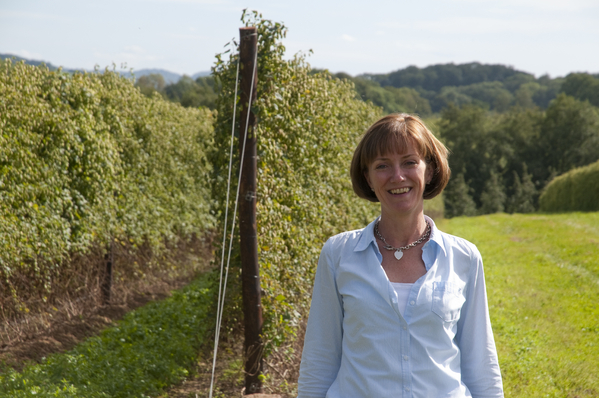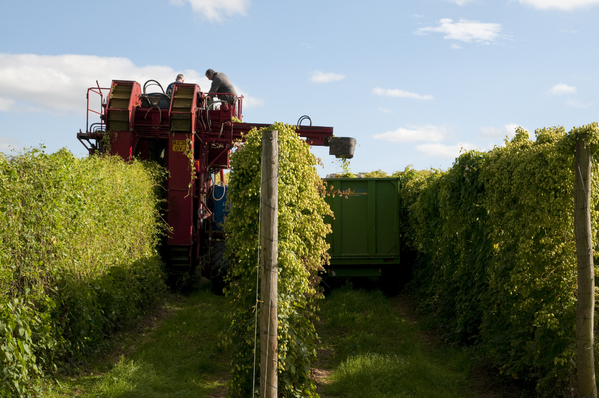Britain's hops are bouncing back
Added: Saturday, August 30th 2014

Can you detect tangerine, grass, grapefruit, blackcurrant, pepper, spice, apricot and mint in your beer? If so, it’s not the work of a craft brewer who’s gone bonkers with additional flavourings – you’re tasting beer made with British hops.
Home-grown hops can give the brewer a rich palette of aromas and flavours – and yet British varieties have gone so much out of favour that the industry has been in serious and even terminal decline.
In October 2012, a major report in the Guardian by its consumer affairs correspondent Rebecca Smithers painted such a gloomy picture that she concluded the entire British hop industry could disappear within a decade.
The severity of the situation is revealed by the jaw-dropping decline of the amount of agricultural land given over to hop growing: 72,000 acres in 1872 and today just 2,500.
And yet the number of new breweries continues to grow. In the early 1970s there were just 40 breweries left in Britain. Today that figure has grown to an astonishing 1,285, the most since the 1930s and 40s.
With breweries proliferating, why aren’t British hops in demand? The answer is that so many of today’s new wave craft brewers are looking for extreme flavours in what they call – inelegant phrase – “hop-forward beers”. Increasingly, they turn to North America for hops that deliver pungent characteristics of grapefruit and other citrus fruits.
Then Alison Capper (above) came riding to the rescue. With her husband Richard, she farms 100 acres in Worcestershire and grows eight hop varieties that produce every year sufficient plants to make 46m pints of beer.
Inspired by Rebecca Smithers’ Guardian report, Ali Capper took the staid and conservative National Hop Association by the scruff of the neck and shook it back to life. She has become the hop champion. She renamed the organisation the British Hop Association to give it greater appeal in export markets and she gives a “Made with British Hops” logo to brewers who wave the flag.
She finds time, in between growing and harvesting her plants, to tour the country with a hop road show she uses to cajole brewers into using more home-grown varieties. In the middle of August she took brewers, farmers, beer writers and just about anyone who cares about beer on a tour of hop farms of Kent.
There they met Dr Peter Darby, a world-renowned hop expert whose Wye Hops company works closely with the hop association to introduce new varieties and boost the fortunes of existing ones.
A two-year whirlwind of activity by Capper is now paying dividends. She reported on the day of the tour that the fortunes of British hops were beginning to turn around. Capper says drinkers in the United States are starting to move away from extreme beers with exaggerated hop flavours and are looking instead for “drinkability”.

“British hops offer delicate yet complex flavours that are ideal for sessionable beers,” she says.
And American hops are likely to become less popular in Britain as a result of a decision by farmers in the U.S. to jack up the price of their plants in the export market. They may think they’re cashing in on the popularity of their varieties abroad but they could price themselves beyond the reach of craft brewers who work with very tight margins.
The British hop industry has also been active in developing new varieties of the plant – including ones that are better for the environment. Peter Darby bred Boadicea early this century, a hop that requires far fewer agri-chemicals and is the closest yet to an organic version of the plant.
It was British farmers who led the way with “low trellis” hops that grow to half the height of conventional ones. They are easier to pick and are less prone to such diseases as downy mildew and pest attack. As a result they are need fewer sprays and fertilisers.
Last year Ali Capper and Peter Darby launched a new hop called Endeavour that offers, in a more delicate fashion, some of the tart citrus flavour so beloved by some British brewers. The hop is a cross between an English variety and the American Cascade, which is famous for its grapefruit/citrus character.
It was grown by the Cappers (hops being picked at Stocks Farm, above) and has been taken up with enthusiasm by Marston’s, which has a rolling programme using different hop varieties every other month in the same pale base beer.
Endeavour is named with a deep bow in the direction of the late fictional detective, Chief Inspector Morse. It was revealed, when he was killed off, that his strict Quaker parents had landed him with the odd first name of Endeavour.
As Morse was known to enjoy the occasional malt beverage, I’m sure -- as he looks down from the Great Saloon Bar in the Sky -- he’ll relish the thought of a hop being named in his honour.








